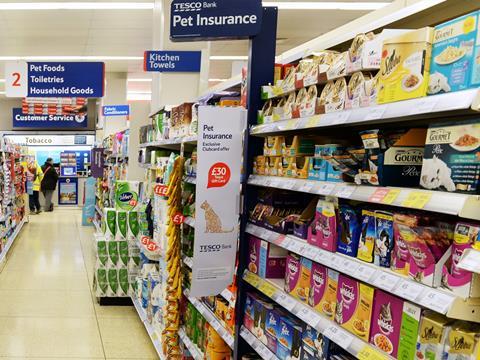The UK's leading retailer Tesco has announced it will start collecting previously unrecyclable plastics to be recycled in ten of its stores. Packaging Europe spoke to trial partner Recycling Technologies about the project.
The initiative will see consumers across the ten selected supermarkets invited to return items such as laminated pet food pouches, sweet wrappers, crisp packets and flexible packaging for products such as fruit, vegetables and toilet roll, none of which are commonly recycled by local authorities and therefore typically buried or incinerated. This packaging waste will be sent for processing by Recycling Technologies, whose plant converts plastic waste back into an wax/oil product called Plaxx® for use as a chemical feedstock in the manufacture of new wax and plastic products.
Under the process, shredded mixed plastics waste is fed into a chamber where the material is heated up in the absence of oxygen to break the waste plastic down into a vapour, which is distilled into Plaxx®.

“We are currently operating a beta plant in Swindon, UK, which processes mixed plastic waste and produces Plaxx®," Recycling Technologies told Packaging Europe. "The company’s first full-scale RT7000 machine is being built this year which will be capable of processing 7000 tonnes annually of mixed plastic waste. The RT7000 machines will be modular, allowing them to be transported and installed within existing waste management facilities where the majority of the residual plastic waste already arises, both in the UK and globally. By taking the solution to the problem, financial and environmental costs of transporting residual plastic waste to an incinerator or landfill are reduced. The company has an assembly facility, also in Swindon, where the RT7000 will be mass-produced and has been designed to produce 200 machines a year, adding 1.4Mt of recycling capacity into the system every year. The technology is very scalable thanks to mass production and our distributed approach.
"There is an urgent need to boost its plastics recycling capacity to meet the demand for recycled materials for use in manufacturing - especially in light of a proposed tax on materials with less than 30% recycled content - and to meet the gap left by the closing of export markets in Asia."
Consumers are crying out to do more to take action on plastic waste; and to be able to recycle more of their plastic packaging waste is a major step forward. The current Great British Spring Clean and Blue Planet ‘LIVE’ series are a wonderful reminder of David Attenborough’s rally-cry to do more. Technology solutions to recycle the currently ‘non-recyclable’ materials are part of the jigsaw; the aim now is to build the urgently-needed capacity to recycle more plastic waste, here in the UK.”
This comes as part of Tesco’s efforts to make all its packaging recyclable, creating a closed loop – preventing packaging from going to waste.
The plastics trial begins with the installation of ten collection booths at Tesco stores in and around the Swindon and Bristol areas. Recycling Technologies has developed and patented a process to turn waste plastic back into oil, Plaxx® - a material which can then be used in the manufacture of new plastic.
Tesco’s Director of Quality, Sarah Bradbury said, “Reducing and recycling plastics is such an important issue for us, for customers and for the future of our planet. That’s why we are working hard to reduce the amount of packaging in our stores and have committed that all remaining packaging will be recyclable by 2025.
“Our trial with Recycling Technologies will make even more of our packaging recyclable and help us reach our target. This technology could be the final piece of the jigsaw for the UK plastic recycling industry.”
83% of all Tesco’s packaging is currently recyclable. Should this soft-plastics collection be rolled out to all Tesco stores, it is estimated that it will be possible to recycle around 90% of Tesco’s own label packaging – the equivalent of 65,000 additional tonnes of plastic being put to good use every year. Tesco is working toward its commitment that all of its packaging is fully recyclable by 2025.
Last year, Tesco made progress towards its ambition for a closed loop packaging system, sharing its intention to stop packing products in the hardest to recycle materials by the end of 2019.
As for the current trial, both parties intend to analyse results in the coming months and assess options for extending the pilot.













